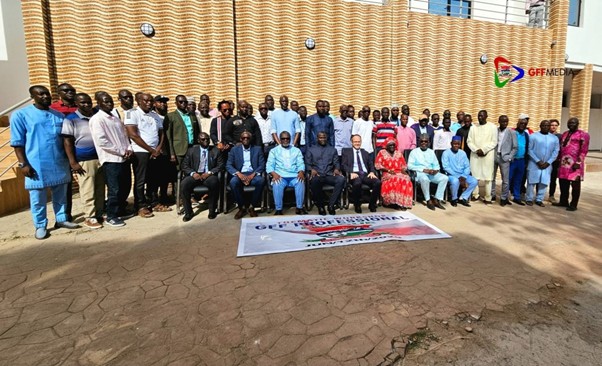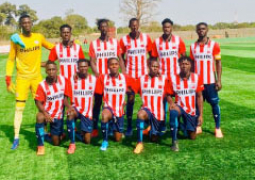
The Federation is currently in the process of building a Business Plan for the league, which economist Professor Momodou Mustapha Fanneh leads.
The Business plan will also identify a roadmap for the league’s growth by ensuring that proper market analysis is conducted, making financial projections, and outlining the organizational structure, as well as the short-term, medium, and long-term viability of the league.
To ensure that it is a people-centered Business Plan, the consultant is serving as the facilitator of the process, and it will involve every single stakeholder throughout the drafting and validation.
It is against this backdrop that those stakeholders gathered at the Metzy Residence Hotel in the Palma Rima strip to collectively charter a way forward for a well-organised, financially sustainable, and all-inclusive professional league.
These stakeholders included the members of the GFF, government agencies, sponsors, media, ex-players, and civil society.
Because of its critical importance as when successful, the professional football league has the potential to contribute meaningfully towards the socio-economic development of the country, as well as bridging the unemployment gap that The Gambia is currently facing. Very much aware of such impact, Minister of Youth and Sports, Bakary Y. Badjie, had to miss the opening stages of a Cabinet Meeting to deliver the keynote address at the opening ceremony.
Minister Badjie reaffirmed that the Gambian Government is very much committed to the process of transforming our football into a sustainable, professional industry, and even called it a national priority.
“Football is more than just a game.
It is a tool for social cohesion, youth empowerment, job creation, and national pride. Despite our immense talent and passion, our league remains underdeveloped. That must change, and it starts with strategic collaboration,” Minister Badjie said.
Minister Badjie stressed that the Gambia National Sports Policy (2024–2034) aligns directly with the goals of the dialogue, outlining support for talent development, governance reforms, infrastructure investment, and public-private partnerships.
He also stressed that the Business Plan will serve as the foundation for a professional league model grounded in accountability, financial sustainability, and institutional growth.
Minister Badjie noted that a well-defined plan will build investor confidence and provide a clear roadmap to transition from ad-hoc operations to a competitive, market-driven model.
“Other key government commitments include upgrading and constructing new sporting facilities across the country, promoting gender equity in football and across all sports, supporting sports data and research for evidence-based planning, enhancing international cooperation, and capacity building. Gambian football must be shaped by those who are committed, engaged, and willing to work together,” he stressed.
Speaking earlier, Lamin Kabba Bajo, under whose leadership the idea of a professional league was born, described the event as not only historic, but one that marks the beginning of a very special journey in the GFF’s path to the development of all aspects of football in the country.
“The past decade plus has witnessed unprecedented development of, and success in, the beautiful game in the country.
The establishment of a professional league has been very prominent on our agenda in order to lift our football to a level that will put us on par with other countries.
This meeting, which brings together the relevant stakeholders, including the government and her other bodies, partners both bilateral and multilateral, the business community and the private sector, football commentators, officials, fans amongst many others, aims at creating a platform to exchange ideas, knowledge and experience to conclude a Business Plan that will entail all relevant information and data,” President Bajo said.
Also speaking at the opening ceremony, Professor Fanneh urged the stakeholders to believe in the realisation of the professional league, noting that, as in other countries, we have to start from somewhere until we can get everything right. Youssoupha Fall, the former agent of ex-Gambian international Abdurrahman Dampha, and now owner of Serrekunda FC as well as Oslo FC in The Gambia and Senegal, respectively, echoed similar sentiments. He talked about how a similar plan helped in helping Oslo FC secure promotion from the fifth tier of Senegalese football to the professional league through a five-year strategic plan. “The Senegalese professional league has been running for 20 years now, and still they do not have everything perfect, so we should all believe in this project and give it our commitment to become successful,” Mr. Fall said.
The event was also attended by the Turkish Ambassador to The Gambia, His Excellency E.F. Turker Oba, and the first Vice President of the GFF, Mr. Bakary K. Jammeh who doubles as the Vice President of Real de Banjul Football Club, one of the clubs many commentators said have currently met all the criteria to join a professional league. The Executive Director of the National Sports Council, Mr. Muhammadou L. Jawla, amongst a host of others, was also present.
The consultations will continue with all the concerned stakeholders, including interactions with regional structures, as the consultations seek to deliver the business plan within 45 days. The event was moderated by the General Secretary of the GFF, Lamin M. Jassey
Source: GFF Media





